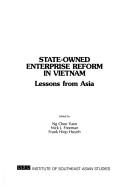| Listing 1 - 10 of 18 | << page >> |
Sort by
|
Book
ISBN: 9789814843638 Year: 2019 Publisher: Singapore
Abstract | Keywords | Export | Availability | Bookmark
 Loading...
Loading...Choose an application
- Reference Manager
- EndNote
- RefWorks (Direct export to RefWorks)
Digital
ISBN: 9789814843638 Year: 2019 Publisher: Singapore ISEAS-Yusof Ishak Institute
Abstract | Keywords | Export | Availability | Bookmark
 Loading...
Loading...Choose an application
- Reference Manager
- EndNote
- RefWorks (Direct export to RefWorks)
Book
ISBN: 9812306587 9812301143 Year: 2001 Publisher: Singapore : ISEAS Publishing,
Abstract | Keywords | Export | Availability | Bookmark
 Loading...
Loading...Choose an application
- Reference Manager
- EndNote
- RefWorks (Direct export to RefWorks)
What are the prospects for stability in Indonesia? Will the country fragment? How will the politics of Malaysia unfold in the next two years? What will happen in the Philippines? Why has foreign direct investment been falling in Southeast Asia compared with Northeast Asia? What will be the economic performance of Southeast Asian countries in 2001 and 2002? Regional Outlook: Southeast Asia 2001-2002 attempts to answer these and other questions with succinct yet substantive analyses of current political and economic trends in the region and the likely developments over the next year or two. It is written by a team of foreign and local experts for the busy non-specialist reader who does not have the time for lengthy academic analyses.
POLITICAL SCIENCE / Political Economy. --- Southeast Asia --- Economic conditions. --- Politics and government.

ISBN: 0415308410 0415347041 113439456X 020316556X 128009897X 0203351207 1138166057 0203060385 1136003827 1283844915 9780203165560 9780415308410 9780415347044 9780203060384 9780415347044 9780203060384 9781134394562 9781134394517 1134394519 9781134394555 1134394551 9781136003820 9781136003981 1136003983 9781136003905 1136003908 9781138166059 Year: 2006 Volume: 1 Publisher: London Routledge
Abstract | Keywords | Export | Availability | Bookmark
 Loading...
Loading...Choose an application
- Reference Manager
- EndNote
- RefWorks (Direct export to RefWorks)
This book explains the dynamics behind Southeast Asia's foreign investment activity, and looks at the region's options for reviving its reputation as an attractive host for foreign investors. Each chapter focuses on a key element; together, they portray southeast Asia's foreign investment profile and prospects. By bringing these key interlocking elements together under a single cover, the book aims to provide a more profound understanding of the challenges southeast Asian countries face in their on-going attempts both to attract new foreign investment inflows and to continue hosting substantia
International finance --- Southeast Asia --- -332.6730959 --- Investments, Foreign --- Capital exports --- Capital imports --- FDI (Foreign direct investment) --- Foreign direct investment --- Foreign investment --- Foreign investments --- International investment --- Offshore investments --- Outward investments --- Capital movements --- Investments --- Government policy --- Economic conditions. --- Investments, Foreign -- Government policy -- Southeast Asia. --- Investments, Foreign -- Southeast Asia. --- Southeast Asia -- Economic conditions. --- Finance --- Business & Economics --- Investment & Speculation
Book
ISBN: 9814843636 9814843628 Year: 2019 Publisher: Singapore : ISEAS-Yusof Ishak Institute,
Abstract | Keywords | Export | Availability | Bookmark
 Loading...
Loading...Choose an application
- Reference Manager
- EndNote
- RefWorks (Direct export to RefWorks)
The EU has threatened to suspend Generalized Scheme of Preferences (GSP) status for Myanmar, under which the country's exports can enter Europe without any tariffs or quotas. The official reason cited by the EU is a growing concern over human rights violations and issues around labour rights in Myanmar. If this threat were to be carried out, the business sector that will be most affected is Myanmar's burgeoning garment sector, which employs around 700,000 people, most of whom are women. The principal worry in Myanmar is that if EU buyers and brands have to start paying tariffs to import Myanmar-made garments, then they will opt to shift their sourcing to other countries. Without GSP, Myanmar's garment exports may no longer be price competitive. As one of the few manufacturing sectors in Myanmar to employ semi-skilled women, many of whom migrated from poor rural areas, the garment sector has come to play an important socioeconomic role in the country. Whether or not the EU decides to withdraw GSP status, Myanmar's garment sector faces a number of challenges. How Myanmar's policymakers and garment industry leaders respond to global industry trends will be just as important, in the long run, in determining the sector's commercial sustainability.
International economic relations. --- Clothing trade. --- Tariff perferences --- Clothing trade --- Apparel industry --- Clothiers --- Clothing industry --- Fashion industry --- Garment industry --- Rag trade --- Textile industry --- Tailors --- Economic policy, Foreign --- Economic relations, Foreign --- Economics, International --- Foreign economic policy --- Foreign economic relations --- Interdependence of nations --- International economic policy --- International economics --- New international economic order --- Economic policy --- International relations --- Economic sanctions --- Europe. --- Burma. --- Burma --- Barma --- Birma --- Birmânia --- Birmanie --- Birmanskiĭ Soi͡uz --- Birmanya --- Birmo --- Bŏma --- Bourma --- Burmah --- Dēmokratia tēs Enōsēs tēs Mianmar --- Enōsē tou Mianmar --- Maenmar --- Miandian --- M'i͡anma --- Mianmar --- Mianmari Államszövetség Köztársasága --- Mien Chin --- Mijanmar --- Mijanmarska Unija --- Miyanma --- Mjanma --- Mjanmaa Unio --- Mjanmao --- Mjanmar --- Mranʻ m --- Mranʻ mā Nuiṅʻ ṅaṃ toʻ --- Myanma --- Myanma Birliyi Respublikası --- Myanma Naingngandaw --- Myanmar --- Myanmar Unionens Republik --- Myanmari Liidu Vabariik --- Myanmarin tasavallan unioni --- Myanmarko Batasuna --- P'idaŭnzu M'i͡anma Naĭnhanda --- Praññʻ thoṅʻ cu Chuirhayʻlacʻ Sammata Mranʻ mā Nuiṅʻ ṅaṃ toʻ --- Praññʻ thoṅʻ cu Sammata Mranʻ mā Nuiṅʻ ṅaṃ toʻ --- Puruma --- Pye Tawngsu Thammada Myanma Naingngan --- Pyi-daung-zu Myan-mar Naing-ngan-daw --- Pyidaungsu Myanmma Naing Ngan-Daw --- Pyidaungsu Socialist Thammada Myanma Naingngandaw --- Pyidaungsu Thamada Myanmar Naing-Ngan-Daw --- Pyidaungzu Myanma Naingngandaw --- Pyidaungzu Thammada Myanma Naingngandaw --- Pyidaunzu Thanmăda Myăma Nainngandaw --- Republic of the Union of Myanmar --- República de la Unió de Myanmar --- República de la Unión de Myanmar --- Republik der Union von Myanmar --- Republika Sŭi͡uz Mianmar --- République de l'Union du Myanmar --- Rėspublika Sai͡uz M'i͡anma --- Sai͡uz M'i͡anma --- Socialist Republic of the Union of Burma --- Svazová republika Myanmar --- Undeb Myanmar --- Unie van Birma --- Unie van Mianmar --- Unija Mjanmar --- Unión de Birmania --- Unión de Myanmar --- Union of Burma --- Union of Myanmar --- Virmania --- Council of Europe countries --- Eastern Hemisphere --- Eurasia --- Birmanskiĭ Soi︠u︡z --- Burma (Union) --- Mranʻ mā --- М'янма --- M'i︠a︡nma --- Рэспубліка Саюз М'янма --- Rėspublika Sai︠u︡z M'i︠a︡nma --- П'ідаўнзу М'янма Найнганда --- P'idaŭnzu M'i︠a︡nma Naĭnhanda --- Саюз М'янма --- Sai︠u︡z M'i︠a︡nma --- Мианмар --- Република Съюз Мианмар --- Republika Sŭi︠u︡z Mianmar --- Μιανμάρ --- ʼΕνωση του Μιανμαρ --- Βιρμανία --- Μπούρμα --- Δημοκρατία της ʼΕνωσης της Μιανμάρ --- ミャンマー --- 미얀마 --- 버마 --- 缅甸 --- Tariff preferences --- Differential duty --- Discriminating duty --- Generalized system of preferences (Tariff) --- GSP (Tariff) --- Preferences, Tariff --- Preferential duty --- Preferential tariff --- Trade preferences --- Tariff --- Clothing workers --- Legal status, laws, etc. --- European Union countries --- Foreign relations --- Garment workers --- Employees --- EU countries --- Euroland --- Europe --- National Unity Government of Myanmar --- National Unity Government of the Republic of the Union of Myanmar
Book
ISBN: 9524552043 Year: 2001 Publisher: Helsinki United Nations University. World Institute for Development Economics Research
Abstract | Keywords | Export | Availability | Bookmark
 Loading...
Loading...Choose an application
- Reference Manager
- EndNote
- RefWorks (Direct export to RefWorks)

ISBN: 981305543X 9814377295 Year: 1997 Publisher: Singapore Institute of Southeast Asian Studies
Abstract | Keywords | Export | Availability | Bookmark
 Loading...
Loading...Choose an application
- Reference Manager
- EndNote
- RefWorks (Direct export to RefWorks)
This study is a collaborative effort between officials and researchers from the transitional economy of Vietnam and researchers from the market economies of Japan and ASEAN. The first section covers aspects of the reform process undertaken in Vietnam as perceived by Vietnamese officials and scholars, and includes rare data and statistics. Section two deals with relevant aspects of the process of deregulation, liberalization and privatization experienced in Japan and the ASEAN countries. The final section provides recommendations for consideration by Vietnam's economic reform planners. Vietnam became a member of ASEAN on 1 July 1995. This study can possibly contribute to Vietnam's integration into the ASEAN economies.Contributors include• Phan Van Tiem • Nguyen Van Thanh • Nguyen Ngoc Tuan • Ngo Tri Long • Ho Phuong • Nguyen Van Huy • Tran Van Nghia • Le Dang Doanh • Kiyoshi Nakamura • Faisal R. Harahap • Mukul G. Asher • Ian Thynne.
Economic policy and planning (general) --- Public economics --- Organization theory --- Association of Southeast Asian Nations --- Japan --- Vietnam --- Government business enterprises --- Nationalized companies --- Parastatals --- Public enterprises --- State-owned enterprises --- Business enterprises
Book
ISBN: 9789814377294 9789813055438 Year: 1996 Publisher: Singapore Institute of Southeast Asian Studies
Abstract | Keywords | Export | Availability | Bookmark
 Loading...
Loading...Choose an application
- Reference Manager
- EndNote
- RefWorks (Direct export to RefWorks)
Book

ISBN: 9789812305091 Year: 2000 Publisher: Singapore
Abstract | Keywords | Export | Availability | Bookmark
 Loading...
Loading...Choose an application
- Reference Manager
- EndNote
- RefWorks (Direct export to RefWorks)
Book

ISBN: 9789812306036 Year: 2001 Publisher: Singapore
Abstract | Keywords | Export | Availability | Bookmark
 Loading...
Loading...Choose an application
- Reference Manager
- EndNote
- RefWorks (Direct export to RefWorks)
| Listing 1 - 10 of 18 | << page >> |
Sort by
|

 Search
Search Feedback
Feedback About UniCat
About UniCat  Help
Help News
News